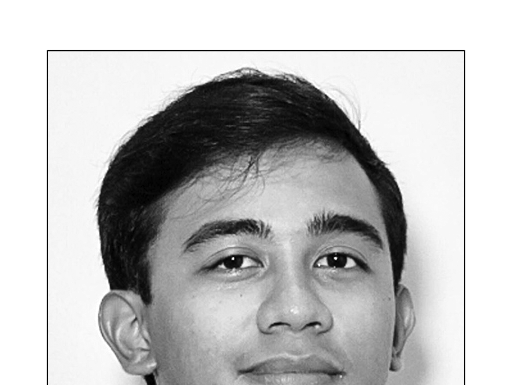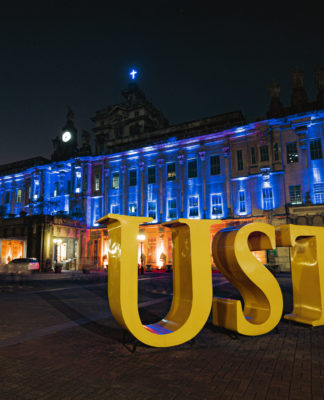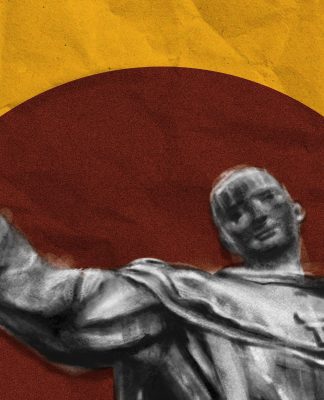UST is experiencing a dramatic increase in enrolment despite the overall slump of private education in the Philippines, in a development seen by University officials as a sign of increased public confidence in the quality of education offered by the oldest university in Asia.
Data released by the University Admissions Office showed that 12,000 freshmen were accepted this school year from more than 40,000 applicants nationwide, about two-thirds more than 7,302 freshmen enrollees last academic year.
UST Rector Fr. Ernesto Arceo O.P., in his message to the Thomasian community at the school opening Mass last June 12, said that all other schools in the University Belt Consortium—except the University of the East (UE)—experienced a decrease in enrollees.
“It takes only the correct vision to see how blessed we are,” Arceo said following the Mass of the Holy Spirit which marked the opening of academic year 2007-2008.
“The University has established over the last four centuries the record and prestige of giving quality education,” Arceo said. “Many can attest to the exemplary work ethic and moral integrity of our graduates.”
While UST did not go out of its way to attract more students, UE—owned by beer, tobacco, and airline magnate Lucio Tan—had to employ aggressive marketing tactics to increase enrollment this school year, the rector added.
UST went beyond its projected enrollment numbers, and even had to turn away applicants for courses such as medicine, considering limited school facilities, he said.
Admissions director Prof. Lucila Bance said the new Alfredo M. Velayo-UST College of Accountancy was among the colleges that contributed to the enrollment surge.
“The College of Commerce (used to have) 25 sections, nine of which went with the College of Accountancy when it was created,” Bance explained. “Our office then had to supply the needed students who are interested in the Commerce slots.”
Bance added that the rector sent a memorandum to all colleges to maximize facilities. With that, Bance said the colleges devised a schedule such that there will be no vacant periods for classrooms.
Bance said: “We also want to retain the quality consideration of the University, not just the quantity filling up of classrooms.”
University registrar Prof. Rodolfo Clavio said that aside from the maximized use of classrooms, the colleges may have possibly increased the number of students per section, too.
In his speech, Arceo also emphasized the need for UST to promote honesty and justice, announcing the creation of a permanent committee for the advocacy of honesty and justice headed by Vice Rector for Religious Affairs and Central Seminary rector Fr. Gerard Timoner, O.P. (see related story on page 1)
“I thought that if we were able to make UST a smoke-free campus, we should be able to make it a cheating-free campus as well,” he said.
Fr. Edmund Nantes, O.P., prior provincial of the Philippine Domincan Province, also called for honesty and justice as he led the opening Mass.
“We can never solve the problem of corruption by resorting to corruption ourselves,” Nantes said in his homily.
Nantes pointed to the recent election in Pampanga where voters rejected candidates connected to gambling lords and quarry operations, and elected a priest, Fr. Ed Panlilio.
Accounting ethics
This year’s discurso de apertura, delivered by Accountancy Dean Jose Ireneo, called for governance and stricter internal controls in businesses as a response to corporate and accounting scandals.
“Greed for wealth and power is what enables corporate executives to mismanage their corporations,” Ireneo said.
Ireneo started his lecture with a rundown of some of the giant corporations that fell into bankruptcy because of mismanagement.
“On a lighter note, the CEOs of those companies involved in the corporate accounting scandals could be given the Nobel Prize in Economics for adapting the mathematical concept of imaginary numbers for use in the business world,” Ireneo said.
Ireneo said the accounting profession has since taken numerous steps in emphasizing ethics and good corporate governance. According to Ireneo, accounting schools in the US have even included new courses on fraud detection, corporate governance, ethics, and internal controls in their curricula.
“We have not yet adopted on a full-scale the needed units for an ‘ethical’ accounting education, but we are already there,” Ireneo told the Varsitarian.
The College of Accountancy has already increased the number of units of its professional ethics course even before the Commission on Higher Education released the new Bachelor of Science in Accountancy program curriculum requiring additional units in ethics and humanities. The College is also planning to open a new degree program on Internal Auditing to incorporate courses on fraud audit and forensic accounting.















